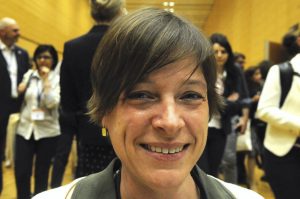#ECFS2018 – Disparities in CF Care Across Europe Focus of ECFS Meeting in Belgrade
Written by |
A baby born with cystic fibrosis (CF) in Germany today is likely to live to be 40 or 50, while another born in the Ukraine will probably die before the age of 18.
That’s the appraisal of Hilde De Keyser, coordinator of Cystic Fibrosis Europe — a Brussels-based federation that comprises 39 national CF organizations. She, along with 2,300 other CF researchers, caregivers and patient advocates, will be at next month’s 41st European Cystic Fibrosis Conference (ECFS) in Belgrade, Serbia.
“Within Europe, CF treatment is very different from country to country,” said De Keyser, a Belgian sociologist who has worked extensively with disabled patients. “Many countries in Europe lack access to know-how and expertise. Other countries have neonatal screening and diagnosis, but no proper medical care.”
De Keyser spoke to Cystic Fibrosis News Today on the sidelines of last week’s 9th European Conference on Rare Diseases & Orphan Products in Vienna.
The Belgrade conference is organized by the European CF Society, which is headquartered in Denmark. It includes two plenary sessions, 30 symposia, 24 workshops, six meet-the-experts sessions, and more than 30 exhibitors.
“We represent patients who have good care and regular follow-up, and good knowledge about their diseases, but also those who don’t dare to tell friends and co-workers that their child has CF,” De Keyser said. “It’s a cultural thing; they’re afraid of people’s reactions.”
More than 42,000 people in 34 European nations have CF, with uneven access to the most basic CF care and therapies found both across and within borders. A 2008 study, “The prevalence of cystic fibrosis in the European Union,” showed a mean 0.737 cases per 10,000 people throughout the EU, which is only slightly less than the U.S. mean of 0.797 per 10,000.
According to the University of Wisconsin study, Ireland had the continent’s highest CF prevalence, at 2.98 per 10,000 inhabitants.
In the U.K., the proportion of CF patients ages 16 and older recently surpassed 60 percent for the first time, with average life expectancy now at 47.
“Yet in many European countries, especially those with low health budgets, people with cystic fibrosis struggle to get even basic treatments such as medicines, nebulizers, physiotherapy, and nutritional and psychological counseling,” De Keyser said. “We are convinced there’s a lot of under-diagnosis of CF in Eastern Europe. We suspect there are patients who die before they’re properly diagnosed, but you can’t prove that.”
Poverty, war complicate life for Ukrainian patients
One such country is Ukraine, where Larysa Voloshyna is president of the national Cystic Fibrosis Association.
She says 817 people are known to have CF out of a population of around 43 million, but that many patients haven’t been diagnosed — partly because the country’s economy is in tatters, and partly because of an ongoing Russian-backed separatist conflict in eastern Ukraine.
“We don’t have enough doctors or clinics for diagnosis. There aren’t enough clinicians to treat CF, and not enough money in the budget, and the government doesn’t recognize any patient registry,” said Voloshyna, speaking through an interpreter. “In the past 25 years, we’ve had 25 ministers of health. This does not contribute to stability in healthcare.”
The Ukrainian government introduced anti-corruption legislation in January 2018 that governs procurement by the country’s 24 oblasts, or regions. But in effect, she said, the law has blocked CF patients from receiving medicines at the regional level. And the state budget covers only three CF medicines: Pulmozyme (dornase alfa), Creon (pancrelipase) and colomycin, an antibiotic.
She is also looking to see how the World Health Organization’s “Essential Medicines List” (EML) as been adopted across Europe to compare to the Ukraine experience and “how it affects CF patients in individual countries,” she said. “We want to go to Serbia and understand what kind of experience they have in resolving similar issues.”
Host nation also struggles in treating patients
Danijela Pesic is vice-president of Serbia’s National Organization for Rare Diseases (NORBS); she’s also president of her country’s national pulmonary hypertension association.
She welcomes the spotlight on Serbia — one of six republics of the former Yugoslavia — that hosting this year’s European CF gathering brings.
“All of Eastern Europe is generally worse off than average when it comes to CF, so it’s good that we’re having this conference in Belgrade,” Pesic said. “Our social security systems are at a very low level. In the future, maybe we can become like the rest of Europe, but now we’re like Africa.”
For years, the country of seven million endured international sanctions following the Balkan wars of the 1990s. “That was bad for the country’s economic development, so today we’re on the bottom of everything,” Pesic said, adding that Serbs with CF and other rare diseases have it especially rough.
“There are no medicines for rare diseases, and it’s difficult for the doctors, too. They have knowledge, but they don’t have the medicines to help their patients,” she said. “We’re doing everything we can to change things for rare diseases. Our Ministry of Health recognizes that and wants to help us.”









